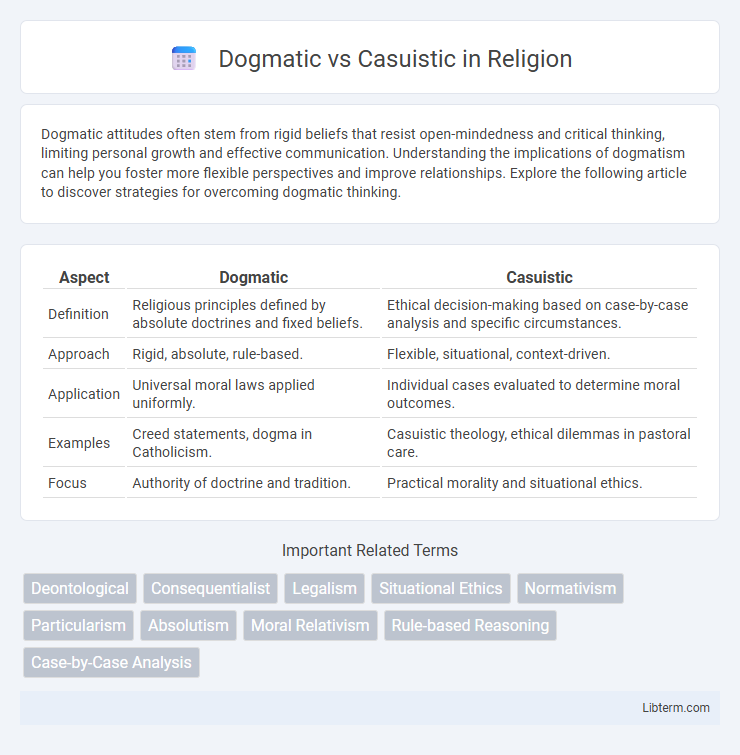Dogmatic attitudes often stem from rigid beliefs that resist open-mindedness and critical thinking, limiting personal growth and effective communication. Understanding the implications of dogmatism can help you foster more flexible perspectives and improve relationships. Explore the following article to discover strategies for overcoming dogmatic thinking.
Table of Comparison
| Aspect | Dogmatic | Casuistic |
|---|---|---|
| Definition | Religious principles defined by absolute doctrines and fixed beliefs. | Ethical decision-making based on case-by-case analysis and specific circumstances. |
| Approach | Rigid, absolute, rule-based. | Flexible, situational, context-driven. |
| Application | Universal moral laws applied uniformly. | Individual cases evaluated to determine moral outcomes. |
| Examples | Creed statements, dogma in Catholicism. | Casuistic theology, ethical dilemmas in pastoral care. |
| Focus | Authority of doctrine and tradition. | Practical morality and situational ethics. |
Defining Dogmatic and Casuistic Approaches
Dogmatic approaches in philosophy and ethics rely on fixed, universal principles that remain constant across situations, emphasizing strict adherence to established rules. Casuistic methods, in contrast, focus on case-by-case analysis, evaluating specific circumstances to determine appropriate actions based on practical considerations. Defining dogmatic versus casuistic approaches involves understanding the former's reliance on absolute norms versus the latter's flexible, context-driven decision-making process.
Historical Origins of Dogmatism and Casuistry
Dogmatism originates from ancient philosophical traditions, particularly within Greek and Roman thought, where fixed principles were established as absolute truths to guide moral and religious beliefs. Casuistry emerged during the medieval period, especially within Christian theology, as a practical method for resolving moral dilemmas through case-by-case analysis. The historical development of dogmatism emphasized universal doctrines, while casuistry focused on contextual application, shaping ethical reasoning in Western intellectual history.
Key Principles of Dogmatic Reasoning
Dogmatic reasoning is characterized by adherence to fixed, universal principles that are considered absolute and unchanging, providing a firm foundation for legal and ethical judgments. It relies on established doctrines and authoritative texts, emphasizing consistency, coherence, and logical deduction to resolve issues. This approach contrasts with casuistic reasoning, which focuses on case-specific contexts and analogies rather than overarching rules.
Foundations of Casuistic Analysis
Casuistic analysis in ethics relies on detailed case-by-case evaluation, using specific circumstances to derive practical moral judgments rather than fixed universal principles. The foundation of casuistic analysis involves applying analogical reasoning, comparing new cases to established precedents to resolve ethical dilemmas with nuanced flexibility. This method contrasts with dogmatic approaches by emphasizing contextual factors and exceptions to general rules, enabling adaptive and situation-sensitive decision-making.
Strengths and Weaknesses of Dogmatism
Dogmatism offers the strength of providing clear, consistent principles that guide decision-making without ambiguity, fostering stability and predictability in ethical or legal systems. However, its rigidity can become a significant weakness, as it may overlook unique circumstances or nuances, leading to inflexible or unjust outcomes in complex cases. Dogmatism's reliance on fixed doctrines often hinders adaptability, limiting responsiveness to evolving social contexts and individualized needs.
Flexibility of Casuistic Decision-Making
Casuistic decision-making offers significant flexibility by addressing ethical dilemmas through case-by-case analysis, allowing adaptation to specific circumstances rather than rigid application of general rules. This method contrasts with dogmatic approaches that strictly follow established principles regardless of situational nuances. The flexibility inherent in casuistry enables more nuanced and context-sensitive resolutions in complex moral situations.
Dogmatic vs Casuistic in Ethics and Law
Dogmatic ethics and law rely on universal principles and fixed rules to determine moral and legal judgments, emphasizing consistency and predictability. Casuistic approaches prioritize case-by-case analysis, considering the specific context and circumstances to reach nuanced decisions. In law, dogmatic methods enforce statutory codes strictly, while casuistry allows more flexibility and discretion in interpreting and applying rules to individual cases.
Real-World Examples: Dogmatism and Casuistry
Dogmatism in legal systems is exemplified by rigid adherence to constitutional principles, where courts strictly enforce predetermined rules regardless of context, such as the U.S. Supreme Court's originalist interpretation of the Constitution. Casuistry appears in judicial discretion cases, like plea bargaining, where judges or lawyers negotiate outcomes based on specific case details rather than fixed laws. Real-world examples highlight how dogmatism often ensures consistency and predictability, whereas casuistry allows flexibility and adaptability to unique circumstances.
Impact on Contemporary Thought and Practice
Dogmatic approaches establish fixed principles that shape contemporary ethical frameworks, providing clear guidelines that influence legal, religious, and philosophical practices. Casuistic methods emphasize case-by-case analysis, fostering flexibility and adaptability in decision-making processes within modern jurisprudence and moral reasoning. The interplay between dogmatic certainty and casuistic nuance drives dynamic advancements in contemporary thought, enhancing both theoretical rigor and practical application.
Choosing Between Dogmatic and Casuistic Methods
Choosing between dogmatic and casuistic methods depends on the context and goals of legal interpretation or ethical decision-making. Dogmatic methods prioritize strict adherence to established principles and codified laws, ensuring consistency and predictability in application. Casuistic methods focus on case-by-case analysis, allowing flexibility and nuanced judgment in complex or unique situations where rigid rules may not provide adequate guidance.
Dogmatic Infographic

 libterm.com
libterm.com